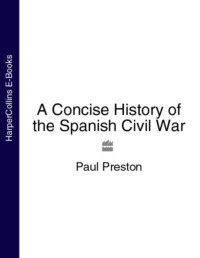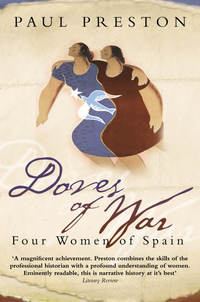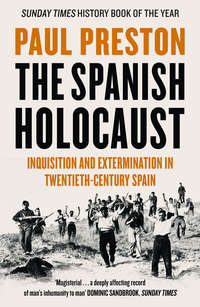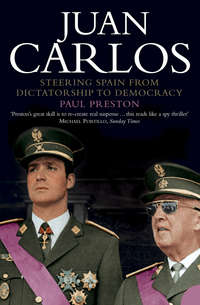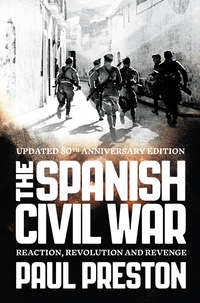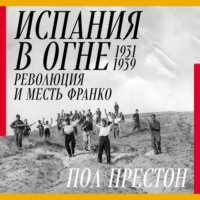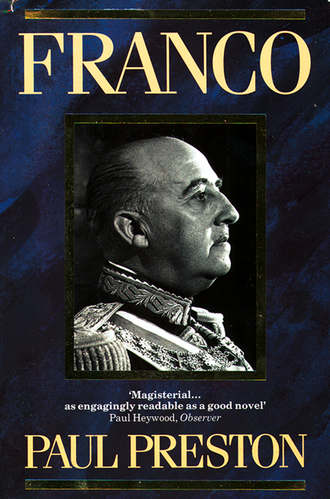
Полная версия
Franco
The arrangements for Franco’s part in the coup were first mooted in Mola’s Directive for Morocco. Colonel Yagüe was to head the rebel forces in Morocco until the arrival of ‘a prestigious general’. To ensure that this would be Franco, Yagüe wrote urging him to join in the rising. He also planned with the CEDA deputy Francisco Herrera to present Franco with a fait accompli by sending an aircraft to take him on the 1,200 kilometre journey from the Canary Islands to Morocco. Francisco Herrera, a close friend of Gil Robles, was the liaison between the conspirators in Spain and those in Morocco. Yagüe, for his part, was devoted to Franco. As a consequence of his clashes with General López Ochoa during the Asturian campaign, he had been transferred to the First Infantry Regiment in Madrid. A personal intervention by Franco had got him back to Ceuta.49 After meeting Yagüe on 29 June in Ceuta, Herrera undertook the lengthy journey to Pamplona where he arrived somewhat the worse for wear on 1 July to make arrangements for an aircraft for Franco. Apart from the financial and technical difficulties of getting an aircraft at short notice, Mola still had grave doubts about whether Franco would join the rising.
However, after consulting with Kindelán, he gave the go-ahead for this plan on 3 July. Herrera proposed going to Biarritz to see if the exiled Spanish monarchists at the resort could resolve the money problem. On 4 July, he spoke to the millionaire businessman Juan March who had got to know Franco in the Balearic Islands in 1933. He agreed to put up the cash. Herrera then got in touch with the Marqués de Luca de Tena, owner of the newspaper ABC, to get his assistance. March gave Luca de Tena a blank cheque and he set off for Paris to make the arrangements. Once there on 5 July, Luca de Tena rang Luis Bolín, the ABC correspondent in England, and instructed him to charter a seaplane capable of flying direct from the Canary Islands to Morocco or else the best possible conventional aircraft. Bolín in turn rang the Spanish aeronautical inventor and rightist, Juan de la Cierva who lived in London. La Cierva flew to Paris and told Luca de Tena that there was no suitable seaplane and recommended instead a De Havilland Dragon Rapide. Knowing the English private aviation world well, La Cierva recommended using Olley Air Services of Croydon. Bolín went to Croydon on 6 July and hired a Dragon Rapide.*50
La Cierva and Bolín arranged for a set of apparently holidaying passengers to mask the aeroplane’s real purpose. On 8 July, Bolín went to Midhurst in Sussex to speak to Hugh Pollard, a retired army officer and adventurer, and make the arrangements. Pollard, his nineteen year-old daughter Diana and her friend Dorothy Watson would travel as tourists to provide Bolín with a cover for his flight. Leaving Croydon in the early hours of the morning of 11 July, the plane was piloted by Captain William Henry Bebb, ex-RAF. Despite poor weather, it reached Bordeaux at 10.30 a.m. where Luca de Tena and other monarchist plotters awaited Bolín with last-minute instructions. They arrived in Casablanca, via Espinho in Northern Portugal and Lisbon, on the following day, 12 July.51
Although the date for his journey to Morocco was now imminent, Franco was having ever more serious doubts, obsessed as usual with the experience of 10 August 1932. On 8 July, Alfredo Kindelán managed to speak briefly with Franco by telephone and was appalled to learn that he was still not ready to join. Mola was informed two days later.52 On the same day that the Dragon Rapide reached Casablanca, 12 July, Franco sent a coded message to Kindelán in Madrid for onward transmission to Mola. It read ‘geografía poco extensa’ and meant that he was refusing to join in the rising on the grounds that he thought that the circumstances were insufficiently favourable. Kindelán received the message on 13 July. On the following day, he sent it on to Mola in Pamplona in the hands of a beautiful socialite, Elena Medina Garvey, who acted as messenger for the conspirators. Mola flew into a rage, furiously hurling the paper to the ground. When he had cooled down, he ordered that the pilot Juan Antonio Ansaldo be found and instructed to take Sanjurjo to Morocco to do the job expected of Franco. The conspirators in Madrid were informed by Mola that Franco was not to be counted on. However, two days later, a further message arrived to say that Franco was with them again.53
The reason for Franco’s sudden change of mind were dramatic events in Madrid. On the afternoon of 12 July, Falangist gunmen had shot and killed a leftist officer of the Republican Assault Guards, Lieutenant José del Castillo. Castillo was number two on a black list of pro-Republican officers allegedly drawn up by the ultra-rightist Unión Militar Española, an association of conspiratorial officers linked to Renovación Española. The first man on the black list, Captain Carlos Faraudo, had already been murdered. Enraged comrades of Castillo responded with an irresponsible reprisal. In the early hours of the following day, they set out to avenge his death by murdering a prominent Right-wing politician. Failing to find Gil Robles who was holidaying in Biarritz, they kidnapped and shot Calvo Sotelo. On the evening of the 13th, Indalecio Prieto led a delegation of Socialists and Communists to demand that Casares distribute arms to the workers before the military rose. The Prime Minister refused, but he could hardly ignore the fact that there was now virtually open war.
The political outrage which followed the discovery of Calvo Sotelo’s body played neatly into the hands of the military plotters. They cited the murder as graphic proof that Spain needed military intervention to save her from disaster. It clinched the commitment of many ditherers, including Franco. When he received the news in the late morning of 13 July, he exclaimed to its bearer, Colonel González Peral, ‘The Patria has another martyr. We can wait no longer. This is the signal!’.54 Fuming with indignation, he told his cousin that further delay was out of the question since he had lost all hope of the government controlling the situation. Shortly afterwards, Franco sent a telegram to Mola. Later in the afternoon, he also ordered Pacón to buy two tickets for his wife and daughter on the German ship Waldi which was due to leave Las Palmas on 19 July bound for Le Havre and Hamburg.55 His foresight did not extend to warning other members of his family. His sister-in-law Zita Polo underwent enormous dangers in escaping from Madrid with her children. Pilar Jaraiz, his niece, was imprisoned with her new-born son.56
Franco’s English teacher wrote later that ‘the morning after the news of Calvo Sotelo’s murder had reached us, I had found him a changed man, when he came for his lessons. He looked ten years older, and had obviously not slept all night. For the first time, he came near to something like losing his iron self-control and unalterable serenity … It was with visible effort that he attended to his lesson.’57 The heady decisiveness with which Franco responded to the news is not incompatible with Dora Lennard’s comment on his sleepless night.* The decision was of sufficient enormity to provoke agonizing doubts, as his precautions for the safety of his wife and daughter demonstrated.
Later, the assassination of Calvo Sotelo was used to obscure the fact that the coup of 17–18 July had been long in the making. It also deprived the conspirators of a powerful and charismatic leader. As a cosmopolitan rightist of wide political experience, Calvo Sotelo would have been the senior civilian after the coup and unlike many of the ciphers that were to be used by Franco. It is difficult not to imagine that he would have imposed his personality on the post-war state. His death, even if no one could have judged it in such terms at the time, removed an important political rival to Franco.
In the short term, Calvo Sotelo’s assassination gave a new urgency to plans for the uprising. The Dragón Rapide had left Bolín in Casablanca and was still en route for the Canary Islands. It arrived at 14.40 on 14 July at the airport of Gando near Las Palmas on the island of Gran Canaria. Hugh Pollard and the two girls took a ferry to Tenerife where he was to make known his arrival by presenting himself at the Clínica Costa with the password ‘Galicia saluda a Francia’. Bebb was left with the aircraft on Gran Canaria to await instructions from an unknown emissary who would make himself known with the password ‘Mutt and Jeff’. Meanwhile, at 2 a.m. on the morning of 15 July, the sleek diplomat José Antonio Sangróniz appeared at Pacón’s hotel room in Santa Cruz de Tenerife with news of the latest developments and the date scheduled for the rising. At 7.30 a.m. on the same morning, Pollard went to the clinic where he contacted Doctor Luis Gabarda, a major of the military medical service, who was acting on behalf of Franco. He was told to return to his hotel and await an emissary from Franco with his instructions.58
Franco had acute immediate problems which took precedence over any long-term ambitions. As military commander of the Canary Islands, his headquarters were in Santa Cruz de Tenerife. The Dragon Rapide from Croydon had been instructed to land at the airport of Gando on Gran Canaria in part because it was nearer to mainland Africa, also because it was known that Franco was being watched by the police but, above all, because of the low cloud and thick fog which afflicts Tenerife. In order to travel from Santa Cruz to Gran Canaria, Franco needed the authorization of the Ministry of War. His request for permission to make an inspection tour of Gran Canaria was likely to be turned down, not least because it was barely a fortnight since his last one. The rising was scheduled to start on 18 July, so Franco would have to leave for Morocco on that day at the latest. In the event he did so, yet none of his biographers seem to regard it as odd that the Dragon Rapide should have been directed to Gran Canaria with confidence in Franco’s ability to get there too. That he got there at all was the result of either a remarkable coincidence or foul play.
On the morning of 16 July, Franco failed to appear for his scheduled English lesson.59 On the same morning, General Amado Balmes, military commander in Gran Canaria, and an excellent marksman, was shot in the stomach while trying out various pistols in a shooting range. Francoist historiography has played down the incident as a tragic, but fortunately timed, accident. Allegedly, a pistol blocked and in trying to free it, holding it against his stomach, it went off.60 To counter suggestions that Balmes was assassinated, Franco’s official biographers have claimed that Balmes was himself an important figure in the plot. His cousin has portrayed Balmes as an intimate friend of Franco. Balmes was allegedly to organize the coup in Las Palmas and thus had to be replaced by Orgaz who was conveniently exiled there.61 Strangely, however, Balmes never figured in the subsequent Pantheon of heroes of the ‘Crusade’. Moreover, it is extraordinary that, despite the fact that Madrid did indeed refuse permission for Franco to travel to Gran Canaria to make an inspection, he and his immediate circle never doubted that they would find a way of getting to Las Palmas. Other sources suggest that Balmes was a loyal Republican officer and member of the Unión Militar Republicana Antifascista who had withstood intense pressure to join the rising.62 If that was true, he had, like many other Republican officers, put his life in mortal danger. It is virtually impossible now to say if his death was accidental, suicide or murder.
What is certain is that he died at the exact moment urgently needed by Franco. The duty of presiding at the funeral gave Franco the perfect excuse to travel to Gran Canaria on the overnight boat. Franco was determined to go without seeking permission for fear that it might be denied. His cousin persuaded him that it would be altogether less suspicious for him to ring the Ministry and inform the under-secretary, General De la Cruz Boullosa. Franco agreed with what turned out to be good advice. The under-secretary expressed surprise that Franco had not been in touch earlier to report on the death of Balmes. He gave the excuse that he had been seeking fuller information on what had happened and was granted permission to preside over the burial. Franco left Tenerife for Las Palmas in the mail-boat Viera y Clavijo shortly after midnight on 16 July. He was accompanied by his wife and daughter, Lieutenant-Colonel Franco Salgado-Araujo, Major Lorenzo Martínez Fuset and an escort consisting of five other officers. They arrived at Las Palmas at 8.30 a.m. on Friday 17 July. Pollard had returned to Las Palmas on the same ferry. Before leaving Tenerife, Franco had collected Sangróniz’s diplomatic passport and gave Colonel González Peral the proclamation of the military rebellion to be used on the following morning. Bebb and Pollard made the final arrangements with General Orgaz. The funeral ceremony for Balmes occupied most of the morning. Franco then took his wife and daughter for a drive around the town. Later, they dined with Pacón and Orgaz.63
Coordinated risings were planned to take place all over Spain on the following morning. However, indications that the conspirators in Morocco were about to be arrested led to the action being brought forward there to the early evening of 17 July. The garrisons rose in Melilla, Tetuan and Ceuta in Morocco. At 4 a.m. in the morning of 18 July, Franco was woken in his hotel room to be given the news. Colonel Luis Solans, Lieutenant-Colonel Seguí and Colonel Darío Gazapo had seized Melilla ‘in Franco’s name’ and arrested the overall military commander in Morocco, the Republican General Gómez Morato. Yagüe had taken charge in Ceuta and Colonels Eduardo Saénz de Buruaga, Juan Beigbeder and Carlos Asensio Cabanillas had taken Tetuán. Franco was to have reason to be grateful for the role of Beigbeder, an accomplished Arabist, in taking over the Spanish High Commission and subsequently securing Moroccan acquiescence in the rising.64
On hearing of their successes, Franco set out for military headquarters in Las Palmas accompanied by his cousin and Major Martínez Fuset and sent for Orgaz to join them there. Franco then sent a telegram to the eight divisional headquarters and the other main military centres of the peninsula. The news that Franco and the Army of Africa were on the side of the rebels was meant as a rallying cry to the conspirators in other areas: ‘Glory to the Army of Africa. Spain above all. Receive the enthusiastic greeting of these garrisons which join you and other comrades in the peninsula in these historic moments. Blind faith in our triumph. Long live Spain with honour. General Franco.’ The sending of such a telegram was an unequivocal indication that Franco attributed to himself a central national role in the rising. At 5.00 a.m. on 18 July, he signed a declaration of martial law. It was to be announced in Las Palmas by an infantry company complete with bugles and drums. At about the same time, a desperate telephone call for Franco came from the undersecretary of the Ministry of War in Madrid, General De la Cruz Boullosa. Martínez Fuset answered and claimed that Franco was out inspecting barracks.65
At 5.15 a.m. in the morning of 18 July, Inter-Radio of Las Palmas began to broadcast Franco’s manifesto. The rather confused text was later attributed to Lorenzo Martínez Fuset.66 The typed copy sent to the radio station had a post-script in Franco’s handwriting, ‘accursed be those who, instead of doing their duty, betray Spain. General Franco’. It avoided commitment to either the Republic or the Monarchy justifying the rising entirely in terms of defending the Patria by putting an end to anarchy. The text also claimed that Franco’s action was necessary because of a power vacuum in Madrid. Some of it was entirely fanciful: the Constitution, it alleged, was in tatters; the government was blamed for failing to defend Spain’s frontiers ‘when in the heart of Spain, foreign radio stations can be heard calling for the destruction and division of our soil’. It threatened ‘war without quarter against the exploiters of politics’ and ‘energy in the maintenance of order in proportion to the magnitude of the demands that arise’ which was an obscure way of saying all resistance would be crushed.67
Franco himself made contact with trusted officers on the island and, on his orders, they seized the post office, the telegraph and telephone centres, the radio stations, power generators, and water reservoirs. He had rather more difficulty persuading the head of the local Civil Guard, Colonel Baraibar, to join the rising.68 While Baraibar wavered, Franco, his family and his group of fellow rebels were in serious danger. Crowds were gathering outside the Gobierno Civil and groups of workers from the port were heading into Las Palmas. Pacón managed to keep the two groups from uniting by use of small artillery pieces and before 7 a.m. had dispersed the crowds. The beleagured group was then joined by retired officers, Falangists and right-wingers who were given arms. The situation remained tense and Franco was anxious to be on his way to Africa. Accordingly, he handed over command to Orgaz. Carmen Polo and Carmencita Franco were taken by Franco’s escort to the port and hidden on board the naval vessel Uad Arcila until the arrival of the German liner Waldi which was to take them to Le Havre.*69
With fighting still going on, Franco himself set off at 11 a.m. on a naval tugboat for Gando airport where Bebb’s Dragon Rapide awaited him. It would have been virtually impossible to reach Gando by a road journey through villages controlled by the Popular Front. The tug went in as near to shore as possible and Franco and his party were then carried to the beach by sailors.70 At 14.05 hours on 18 July, the aircraft took off for Morocco. It has been suggested that, for fear of his plane being intercepted, Franco carried a letter to the Prime Minister announcing his decision to go to Madrid to fight for the Republic.71 This seems to be contradicted by the fact that, armed with Sangróniz’s passport, Franco was passing himself off as a Spanish diplomat. He thus changed from his uniform into a dark grey suit, Pacón into a white one and both threw their military identification papers out of the aircraft.72 Franco put on a pair of glasses and, at some point on the journey, shaved off his moustache.
There is considerable dispute about the details of the journey. Arrarás and Bolín have a dark grey suit for Franco, Franco Salgado-Araujo white summer suits for both. All three are more plausible than Hills who claims that Franco changed into Arab dress and Crozier who adds, bizarrely, a turban. Arab dress would have been an odd choice of disguise for someone travelling on Sangróniz’s Spanish diplomatic passport. Franco Salgado-Araujo claims that they put their uniforms in a suitcase and threw it out of the aircraft. Given the difficulty of throwing a suitcase out of an aircraft in flight and the fact that they emerged from the aircraft in uniform at the end of their journey, it appears that Pacón’s memory failed him. There is also contention about the when and where of the demise of the moustache. The issue is whether he shaved on board the aircraft or later, during the stop-over at Casablanca. Pacón and Arrarás place the event on the aircraft but it is unlikely that Franco had a dry shave in a bumpy aircraft in the early stages of his journey. Luis Bolín, who shared a hotel room with Franco in Casablanca, claims that he shaved there. The emergency pilot also claimed the credit for removing the moustache.73 Whenever the momentous shave took place, it gave rise to Queipo de Llano’s later jibe that the only thing that Franco ever sacrificed for Spain was his moustache.74
They made a stop at Agadir in the late afternoon where they had some difficulty in getting petrol. The Dragon Rapide then flew onto Casablanca, where, arriving late at night, they were surprised by the sudden disappearance of the landing lights. With fuel running out, there were moments of intense anxiety. The airport was officially closed but Bolín had bribed an official to open up. The light fault was only a blown fuse. When they had landed safely and were eating a sandwich, they decided on the advice of Bebb not to continue the journey north until morning. They then spent a few hours in a hotel. At first light, on 19 July, the aircraft took off for Tetuán. Franco, who had barely slept for three days, was full of vitality at 5.00 a.m. On crossing the frontier into Spanish Morocco, Franco and Pacón changed back into uniform. Unsure as to the situation that awaited them, they circled the aerodrome at Tetuán until they saw Lieutenant-Colonel Eduardo Saenz de Buruaga, an old Africanista crony of Franco. Totally reassured, Franco cried ‘podemos aterrizar, he visto al rubito’ (‘we can land, I’ve just seen blondy’), and they landed to receive the enthusiastic welcome of the waiting insurgents.75
Quickly made aware of the dramatic shortage of aircraft available to the rebels, Franco decided that Bolín should accompany Bebb in the Dragon Rapide as far as Lisbon to report to Sanjurjo and then go on to Rome to seek help. Two hours after depositing its passengers, the Dragon Rapide set off for Lisbon at 9.00 a.m. carrying Bolín with a piece of paper from General Franco which read ‘I authorize Don Luis Antonio Bolín to negotiate urgently in England, Germany or Italy the purchase of aircraft and supplies for the Spanish non-Marxist Army’. When Bolín asked for more details, Franco scribbled in pencil on the bottom of the paper ‘12 bombers, 3 fighters with bombs (and bombing equipment) of from 50 to 100 kilos. One thousand 50-kilo bombs and 100 more weighing about 500 kilos.’ In Lisbon, Bolín was to get the further authorization of Sanjurjo for his mission. On 20 July, the aircraft went from Lisbon to Biarritz. On 21 July, Bebb* took Bolín to Marseille whence he travelled on to Rome in order to seek military assistance from Mussolini.76
The fact that Franco should so quickly have decided to do something about the rebels’ need for foreign help is immensely revealing both of his self-confidence and his ambition. Sanjurjo was convinced that Franco aspired to nothing more than to be Alto Comisario in Morocco. However, his experience during the repression of the Asturian rising had given Franco a rather greater sense of his abilities and a significantly higher aspiration. How far-reaching those ambitions were to be was as yet something even Franco did not know. The situation would change rapidly as rivals were suddenly eliminated, as relationships were forged with the Germans and Italians and as the politics of the rebel zone fluctuated. Ever flexible, Franco would adjust his ambitions as, in the dramatic events ahead, more enticing possibilities arose.
* Pemán, a sardonically witty poet and playwright, was member of the extreme right-wing monarchist group, Acción Española.
* The necessary funds to hire Dragon Rapide G-ACYR – £2000 – were supplied by Juan March through the Fenchurch Street branch of Kleinwort’s Bank.
* On other occasions, Franco would show a similar determination to move on, apparently indifferent to the tragedy just recounted to him. The demise of Alfonso XIII in 1931, the death of Mola in April 1937 and Mussolini’s fall from power in 1943 all produced nearly identical responses.
* There they were met by Franco’s friend, the Spanish military attaché in Paris, Major Antonio Barroso who escorted them to Bayonne. They were to remain for the first three months of the Civil War in the home of the Polo family’s old governess Madame Claverie, under the protection of Lorenzo Martínez Fuset.
* After the civil war, Bebb and Pollard were decorated with the Falangist decoration the Knight’s Cross of the Imperial Order of the Yoke and the Arrows. Dorothy Watson and Diana Pollard were given the medal of the same order.
VI
THE MAKING OF A GENERALÍSIMO
July – August 1936
THERE CAN be no doubt that the unlikely figure of Franco, short and with a premature paunch, had a remarkable power to lift the morale of those around him. It was a quality which would play a crucial role in the Nationalist victory and would single him out as leader of the rebel war effort. Having finally shaken himself out of his spring-time hesitations, he once again temporarily resumed the adventurous persona which had served him so well in his rise to the rank of general. It could not have been better suited to the early days of the rising and would see him victoriously through the first months of the Civil War and take him to the doors of absolute power. At that point, caution would reassert itself.


